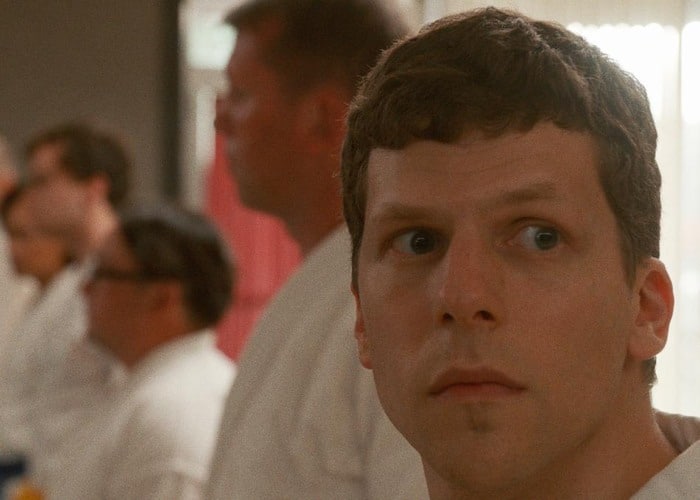The subject of toxic masculinity is one worthy of exploration and condemnation, and movies as diverse as Fight Club (1999) and Moonlight (2016) have done just that. Like many other negative aspects of human behavior, it remains an issue in society, so any additional light shined onto it can only be a good thing. Well, that’s the theory anyway.
Casey (Jesse Eisenberg) is a mild-mannered accountant prone to being bullied and belittled by co-workers every day before he returns home to his dachshund and his empty answering machine. He reaches something of a breaking point, though, when he’s attacked one night by helmeted motorcyclists who beat the tar out of him and steal his wallet. Casey’s bones heal soon enough, but his psyche is having far more trouble. He decides to join a local karate class run by a man known only as the sensei (Alessandro Nivola), and as he grows more competent and confident in his fighting skills he also learns what it means to be a “man.”
Writer/director Riley Stearns (Faults, 2014) sets Casey on a journey of self-discovery in The Art of Self Defense, but while it features a handful of funny beats along the way it’s a trip that most viewers will conclude well before Casey does. That’s true in a narrative sense as a third-act plot revelation is evident in the opening fifteen minutes, but it’s also present in the film’s central themes. Toxic masculinity is bad, harmful to others, and insincere in its intentions — these aren’t particularly newsworthy observations, but the film spends the vast majority of its running time mocking sensei’s “manly” alternatives to Casey’s perceived weaknesses to no other purpose than the mockery itself.
Casey likes little dogs, French things, and adult contemporary music? He’s made to change them to large dogs, German things, and heavy metal. It only gets worse when Casey joins the dojo’s night class where he discovers how open these men are to violence and homoerotic wind-down time. We get it. These guys are idiots and assholes oblivious to their own hypocrisies, and while they may seem exaggerated it’s probably a safe bet that the real world holds plenty of living, breathing examples. But to what end are we experiencing this with him?
It’s meant as a satirical take on the subject, but it feels ultimately purposeless and lacking in energy. While Fight Club offers inventiveness, structure, and commentary, and Moonlight breaks down racial and cultural barriers on what it means to be a man, The Art of Self Defense just points out the obvious. Worse, after partaking of the brutal violence celebrated by sensei and his students, Casey simply decides he’s no longer on board with it. There’s a conflicting message in denouncing men prone to violence and then letting our “hero” off the hook for his own participation.
Similarly, the film’s sole female — a student named Anna (Imogen Poots) who’s constantly mistreated throughout — is shown to be every bit as lifeless and flat in her response to the world. Men are a problem, but the fact that she’s still around suggests she’s not the sharpest knife in the drawer either. And then there’s the film’s conclusion. It shouldn’t surprise at this point to learn it involves violence, but it does so in a way that again leaves its message muddled and ineffective.
As mentioned, there are some funny beats here crafted out of dry humor and smart delivery, and they almost without exception all come courtesy of Nivola. His sensei is either a very sane prick or an absolute nutter, but his thoughts and comments are often made ten times funnier through his performance. “I realize now that her being a woman will prevent her from ever becoming a man,” is a fantastic line, and he nails it with sincerity.
The characterizations and observations in The Art of Self Defense are on the nose and occasionally amusing. Those are traits more suitable for a clown than a karate master, and you can make of that what you will.

